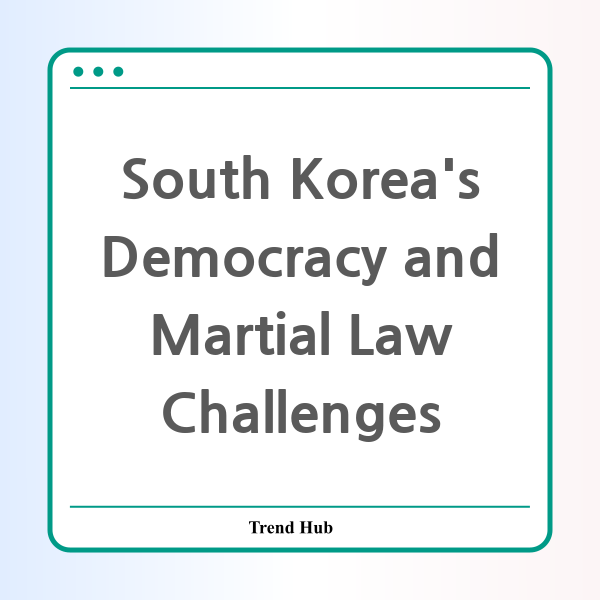* This website participates in the Amazon Affiliate Program and earns from qualifying purchases.

Can South Korea's democracy withstand the shadows of martial law? This pressing question arises as the nation grapples with recent unprecedented political turmoil. On December 3, an emergency declaration by President Yoon Suk-yeol plunged the country into a state of crisis that echoed memories of its past autocratic regimes. The declaration not only suspended freedoms but also attempted to erase the democratic foundations built over the past few decades.
Yoon's announcement was alarming, declaring martial law in the face of no genuine threats, merely citing vague concerns about North Korea. This move, perceived as a power grab, incited massive protests across the nation, demonstrating that the South Korean public is not only vigilant but also resilient. Thousands rallied to protect their democratic values, with members of the opposition racing against military forces to assert their constitutional rights. The assembly, empowered by law, promptly voted to revoke Yoon's emergency order, signaling a staunch defiance against authoritarian overreach.
South Koreans, historically sensitive to government control due to their tumultuous past, responded swiftly, uniting against what was viewed as an illegitimate assault on democracy. With 75% of citizens favoring Yoon's resignation, an impeachment process was soon set into motion. This critical moment in South Korea's political landscape showcased the underlying tensions between different ideological groups, particularly between the conservative People’s Power Party (PPP) and the opposition Democratic Party.
The aftermath of Yoon's martial law declaration transformed into a revealing chapter in South Korea's democracy. The PPP, initially supportive of Yoon, faced internal divisions as moderate voices within the party began to distance themselves from the president's extreme measures. The political landscape became a battleground between those who support Yoon's far-right ideology and others advocating for a return to moderate conservatism.
During this period, the importance of civil society became glaringly apparent. The bravery of ordinary citizens who stood up against military forces demonstrated that democracy is a collective endeavor. As protests erupted, the role of civic engagement took center stage, illuminating the necessity for reforms that elicit greater public participation in politics.
Addressing the needs of a diverse electorate is paramount for the future of South Korea. Political leaders must bridge the generational divide, democratizing the political discourse and engaging younger citizens who feel alienated from traditional institutions. Initiatives that foster intergenerational dialogues and enhance civic education can empower more citizens to engage actively in governance.
Moreover, as misinformation continues to plague the political sphere, the responsibility falls to journalists and educators alike to combat the spread of fake news. Fostering media literacy and critical thinking skills is essential for a well-informed electorate. By doing so, South Korea can build resilience against extremist rhetoric that thrives in echo chambers like far-right social media groups.
Ultimately, the future of South Korea's democracy does not rely solely on its political leaders or institutions but rather on the collective will of its people. If South Koreans successfully navigated the challenges posed by a military dictatorship before, they possess the strength to reclaim and reinforce their democratic principles moving forward. This moment in history may very well be a catalyst for profound change—a new chapter that prioritizes civic engagement and inclusive governance.
As the Constitutional Court deliberates the outcome of Yoon’s impeachment, it’s clear that South Korea’s democracy is at a crossroads. This pivotal moment invites a reflection on the importance of grassroots activism and the need for reforms that restore faith in political systems and encourage participation from all sectors of society. The lessons from this crisis will reverberate in the years to come, shaping a stronger future for Korean democracy.
* This website participates in the Amazon Affiliate Program and earns from qualifying purchases.